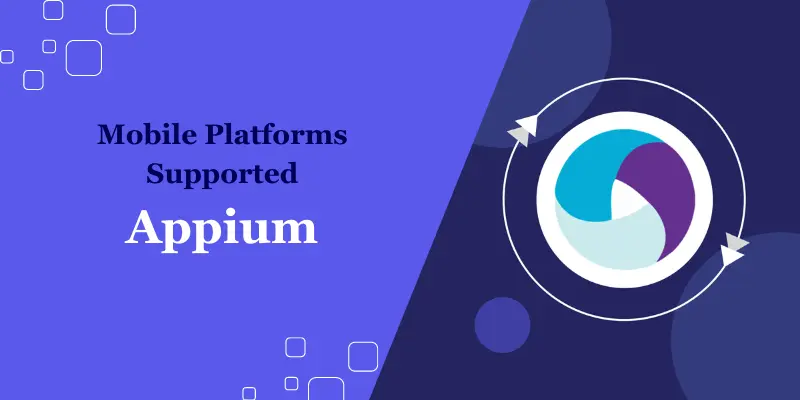Mobile app testing has become essential to ensuring applications’ functionality, performance, and user experience across different devices and platforms. Appium, one of the most popular open-source tools for mobile app automation testing, offers a versatile and flexible solution to support various platforms. In this blog, we will explore the different mobile platforms that Appium supports and how it simplifies the testing process for developers and testers.
Appium
Appium is a cross-platform mobile automation testing tool that allows developers to write tests for mobile applications across different platforms using a single codebase. It supports native and hybrid applications, making it a powerful tool for companies that need to test their apps on multiple devices. Appium enables users to interact with mobile devices through automation scripts without requiring any modifications to the app itself, making it an excellent choice for ensuring that mobile apps work seamlessly across various platforms and device types. To master this tool, consider enrolling in Appium Training in Chennai to gain practical expertise and enhance your mobile testing skills.
Appium Support for Android
Appium strongly supports Android, one of the most widely used mobile operating systems in the world. Android app testing is essential for ensuring that applications perform correctly across various Android devices, which differ in screen size, hardware specifications, and OS versions. Appium supports automation for Android apps on both real devices and emulators, giving testers the flexibility to cover different testing scenarios.
Appium can automate:
- Native apps: Explicitly developed for Android using Android SDK and run on Android devices.
- Hybrid apps: Developed using web technologies (HTML, CSS, JavaScript) and wrapped in a native shell.
- Mobile web apps: Accessed via mobile browsers on Android devices.
For Android automation, Appium leverages the UI Automator framework for Android versions above 4.2. For lower versions, it uses Selendroid. This allows developers to interact with elements on the screen, such as buttons, text fields, and scrollable areas, making it easy to write comprehensive tests. To gain in-depth knowledge on effectively using these frameworks, consider enrolling in Appium Training, where you’ll learn the best practices for Android automation.
Appium Support for iOS
Appium also provides robust support for iOS, Apple’s mobile operating system. Testing iOS applications is crucial due to the consistency and high-quality expectations of iPhone and iPad users. It supports both real iOS devices and simulators for iOS app testing, allowing for various test configurations.
Appium can automate:
- Native iOS apps: Built specifically for iOS using Objective-C or Swift.
- Hybrid iOS apps: Developed using web technologies and wrapped in a native shell, like those built with frameworks such as Cordova or Ionic.
- Mobile web apps: Accessed via the Safari browser on iOS devices.
Appium uses Apple’s XCUITest framework for automating iOS apps. XCUITest allows Appium to interact with the UI elements in an iOS app. This provides access to buttons, sliders, input fields, and more. This enables comprehensive testing of user interactions and app behavior.
Appium for Windows Mobile Apps
While not as prominent as Android or iOS, Appium also supports Windows mobile applications. With the decline of Windows Phone, Appium’s support for this platform is less frequently used today. However, Appium can still automate testing for Windows desktop applications and universal apps that run on Windows Mobile. It uses the WinAppDriver to automate interactions with Windows apps. To broaden your testing and development skills across multiple platforms, consider enrolling in Mobile App Development Courses in Chennai to gain practical knowledge and hands-on experience. While the Windows mobile platform may not be widely used, Appium’s support demonstrates the tool’s flexibility in covering multiple operating systems. Appium ensures that legacy apps or enterprise applications running on Windows can still be tested and maintained.
Cross-Platform Testing with Appium
One of Appium’s greatest strengths is its ability to support cross-platform testing. This means testers can write a single set of test scripts and run them on Android and iOS platforms with minimal changes. This feature dramatically reduces the time and effort required to test mobile apps across different platforms. Appium’s cross-platform support is a significant reason why it is favored by companies looking for scalable, efficient mobile testing solutions.
Appium’s versatility in supporting Android, iOS, and Windows platforms makes it an ideal tool for mobile app automation testing. Its ability to automate native, hybrid, and mobile web apps on different operating systems provides developers the flexibility to ensure comprehensive test coverage. Additionally, Appium’s cross-platform testing capabilities enable testers to save time and effort by writing a single codebase for multiple platforms. To further enhance your skills in this area, consider enrolling in a Mobile App Development Course Online to understand cross-platform app testing and development techniques better.
In an era where mobile apps are expected to perform flawlessly across various devices and platforms, Appium’s multi-platform support offers a solution. This support provides developers and testers with an efficient way to maintain high-quality mobile applications. Whether you are developing for Android, iOS, or Windows, Appium provides the tools to automate your testing process. This ensures you deliver an excellent user experience.
Also Check: What Are Some Common Challenges When Scaling Appium Automation?

